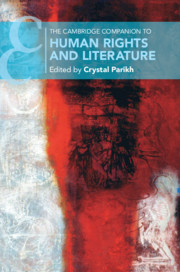Book contents
- The Cambridge Companion to Human Rights and Literature
- The Cambridge Companion to Human Rights and Literature
- Copyright page
- Epigraph
- Contents
- Notes on Contributors
- Chronology of Major Works and Events, 1215–2018
- Introduction
- Part I Genealogies and Contexts
- Part II Fashioning Methods
- 5 Law and Literature, the Procedural and the Performative
- 6 Human Rights Modes and Media
- 7 Remembering the Forgetting
- 8 Queering Human Rights
- Part III Generic Representations
- Part IV Writing Human Rights
- Select Bibliography
- Index
- Cambridge Companions To …
7 - Remembering the Forgetting
Human Rights Literature and Memory Work
from Part II - Fashioning Methods
Published online by Cambridge University Press: 24 June 2019
- The Cambridge Companion to Human Rights and Literature
- The Cambridge Companion to Human Rights and Literature
- Copyright page
- Epigraph
- Contents
- Notes on Contributors
- Chronology of Major Works and Events, 1215–2018
- Introduction
- Part I Genealogies and Contexts
- Part II Fashioning Methods
- 5 Law and Literature, the Procedural and the Performative
- 6 Human Rights Modes and Media
- 7 Remembering the Forgetting
- 8 Queering Human Rights
- Part III Generic Representations
- Part IV Writing Human Rights
- Select Bibliography
- Index
- Cambridge Companions To …
Summary
This chapter studies the work of memory in the domain of non-reconciled human rights, with respect to the cultural representations of the authoritarian Khmer Rouge regime in Cambodia. The work of memory, the author suggests, takes place outside the ambit of international human rights actors such as states and non-governmental organizations, and also that of conventional legal and juridical methods that are used to redress violations. To illustrate this point, she charts the history of the so called “Pol Pot time,” especially by means of a close reading of Rithy Panh’s 2011 memoir, The Elimination: A Survivor of the Khmer Rouge Confronts His Past and the Commandant of the Killing Fields. Bringing these postulations to the present moment, the chapter closes with a discussion of the United Nations/Khmer Rouge Tribunal.
- Type
- Chapter
- Information
- The Cambridge Companion to Human Rights and Literature , pp. 100 - 113Publisher: Cambridge University PressPrint publication year: 2019

